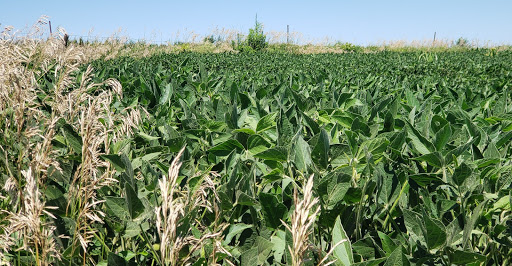Good morning. Many farmers in the midwest noticed how slow a start and how short our soybean crop was earlier. Soybean planting was very timely and many fields were planted during the same time frame in April as corn.
Soybeans had a stressful environment this spring. We started cooler, wetter, and cloudier. The pre-plant herbicides also seemed to hurt emergence and early growth. Then if you remember we had a killing frost in May. We had to replant 250 acres.
Actually with even a half a stand (number of plants per acre) a soybean plant will adapt, bush out, and fill in the canopy. Also shorter plants have the same amount of nodes (where flowering and pods develop) as a taller plant. The nodes are just closer together and the pods are closer to the ground. Unlike corn, the soybean plant productivity continues all through the season and maturity is determined by the length of days and sunlight hours.
The beauty of a soybean is it's ability to adapt. We are spraying our soybeans a 3rd time to help them take advantages of the most opportunities possible. We are spraying a fungicide to prevent disease. An insecticide to prevent pest. And a foiliar fertilizer for extra growth. Many of those slow, short soybeans are now rubbing the bottom of the sprayer. Thanks for the picture Kasey.
Soybeans have a big picture personality. Corn has more of a detail personality. The potential girth of a corn ear is determined at knee high. The potential length is determined at waist high. A corn plant does not like to have a bad day. And a corn plant does not like to run out of gas (nitrogen). It will turn yellow, start to drop it's bottom leaves, and shut down production. However corn has huge potential when things are right with every ear per acre equaling around 8 bushel meaning a 30,000 population has the potential for 240 BPA crop.
My friend John and I went and looked at a patch of his corn that was on the ground. Low and behold this was a result of a raccoon party with every ear eaten. I have not seen this much coon damage before. The deer usually eat all the ears along the outside rows but don't destroy the whole plant like this.
Remember a couple of weeks ago we talked about coming up with a plan B for saving our sweetcorn from the raccoons? Well after a couple of attempts I went and got a ladder, an extension cord, and a radio. I put the radio on a news channel and put the volume wide open. The news has been so depressing the coons couldn't stand to listen and haven't been back. :)
We "did" sweetcorn just about every day this week doing about 25 quart at a time. We also gave that much or more away. We just had to find a way to adapt to a bunch of hungry raccoons and want it worse than they did.
This "ability to adapt" story is not as much fun. As you can see in the window, Mom is in skilled care in Montezuma. However as most of you already know visitors are not allowed face to face. I found an old chair on a patio and put it by her window and our family gets to see her. We talk by phone. And I bring her notes and things to read.
I feel sorry for Dad. Mom is more adaptable to her surroundings. Dad's like me and isn't crazy about getting older and losing freedoms. He fell this week and injured an old stress fracture in his back. He is currently in the Oskaloosa hospital. Because of his hearing loss phone conversations are just about impossible.
Folks want to know that they belong. That they are loved. And that they have a purpose. Our job here on earth is to help make that happen. We are to feed His sheep. Where did that come from you say?
We often fall short. So did others. Jan and I walked down these steps in Jerusalem last November. They go down the hill from Caiaphas, the high priest house in Bible times. Jesus walked down these steps to the cross to pay for our wrongs. Peter cried bitterly as he walked down these steps after falling short and denying Jesus three times. However a couple of weeks later after Jesus' resurrection Jesus went and found Peter back fishing (his old job). He asked Peter three times if he loved Him. And three times Jesus told Peter to feed His sheep. Peter adapted to his new calling and became one of the prominent preachers in history.
We are living in stressful environments on many fronts. Yet we were created and called to bear fruit (be productive). We are not just to love God. We are to be shepherds. We are the story of two Americas right now. We can choose to step back, shut down, and be scared. Or we can adapt, step forward, and lead. Like I heard somewhere this past week, we are to be strong but not rude, and kind but not weak. How we respond during the rest of this year will determine our children and grandchildren's future. Thank you so much for stopping by.























No comments:
Post a Comment